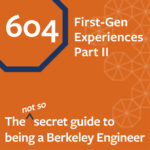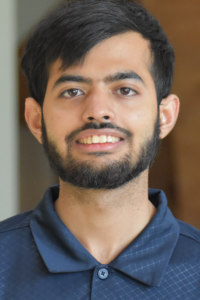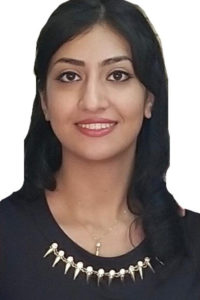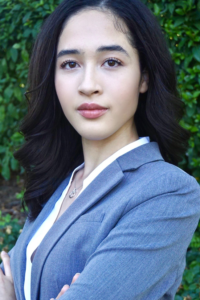ESS 604: First-generation experiences, part II


Muhammad Sohaib

Elham Zakeri

Paige Lyles
We want our new students to hear their peer’s stories. Our second installment of first-generation stories from Paige Lyles, Muhammed Sohaib and Elham Zakeri, includes working with their family’s expectations, building community, finding resources and final thoughts.
Links:
Laura Vogt:
Hello, and thank you for joining us on this week’s the (Not So) Secret Guide to Being a Berkeley Engineer. My name is Laura Vogt. I’m the Associate Director for Marketing and Communications for the College of Engineering. And this week, it is our second part in our first generation college student experience interviews. And we’re going to be hearing from our three current Berkeley engineering students, Paige, Sohaib and Elham. They’re all returning transfer students, and our discussion includes working with their family’s expectations, building a community, finding resources and final thoughts. Let’s start with a short introduction from each of our guests so that you can familiarize yourself with who they are and what their major is.
Paige Lyles:
So, yes, my name is Paige Lyles, and I am a rising senior majoring in civil engineering.
Muhammed Sohaib:
Hey, Laura. My name is Muhammed Sohaib. I go by Sohaib, because that’s my given name, and my major is civil environmental engineering.
Elham Zakeri:
Sure. So my name is Elham Zakeri, and I’m currently an undergrad. I’m graduating next semester. I’m studying electrical engineering and computer science.
Laura Vogt:
What does it mean to you to be a first generation college student?
Muhammed Sohaib:
I think I accept that as a challenge because of my parents. First of all, I want to talk about my parents. My mom and my dad do attend community college back in Pakistan, home country. And they have learned English. Majority of American people does not know that English is our official language of Pakistan. It is being taught in the school.
Paige Lyles:
I think a word that comes to me is resilience. I think the first generation college experience is something that’s unique, but so many of us here on campus share that experience. And it comes with a lot of territory, including just different kinds of responsibilities, different upbringings. And yeah, so I feel like the word resilience really captures what that experience is.
Laura Vogt:
Have you found it difficult to explain that balancing act between your education and what your family wants from you?
Muhammed Sohaib:
I think now in community college, I was more active with my family activities, helping them with their [inaudible 00:02:18]. I was helping with the bills. I was helping with health insurance. I was helping my father with his job and stuff. I was more involved with my family, but ever since I came to Berkeley, to be honest, I’m not giving enough time to them.
Laura Vogt:
Have you thought about pursuing grad school and what does your family think about you continuing on though that way?
Paige Lyles:
Yeah, so I definitely have thought about that, and that’s why I think it’s so great for the summer to be able to do that because that program that I’m in is going to kind of give us mentorship in that sphere and help us to really understand what grad school entails. Because I even think that that concept, some people have a different idea of what grad school really is. And I myself am still trying to understand masters versus PhD and what kind of opportunities those bring about. My family is definitely very supportive. They’ve always been supportive of me. They understand how much this degree means to me, undergraduate degree, as well as just my goals and how I want to achieve them.
Laura Vogt:
How did you find the club or organizations that you decided to take part in?
Paige Lyles:
Definitely. So my experience getting into Berkeley was a little different because since my community college, Diablo Valley College, for any Vikings out there in Pleasant Hill, because it is so close to Berkeley, just like how high school students can cross-enroll in their local community college, DVC students can cross-enroll in Berkeley. So actually that year 2020 where everything changed, I had cross-enrolled in UC Berkeley because I said, “Under normal circumstances, I’m a 30 minute drive. Commuting would be an issue.” I can’t really get a taste of the Berkeley life while also trying to sustain my community college academics and make sure I do well in that area. So being online, I did that. And the first thing I really loved about the Berkeley community is just how open and kind everyone is. I remember going onto a Zoom call with the Cal Construction Club and thinking, “Oh my gosh, can I even be here? I’m not fully matriculated.”
Paige Lyles:
And the president at the time was LA and he was so nice and was like, “Oh my gosh, Paige. Of course, take your time. Get to know people in the club. You can definitely be in the meetings and just learn what we’re doing.” So that experience, I was able to learn about construction project management, really understand that I liked what I was learning, meet Berkeley students and get to know them. And I had no idea that I would be able to compete because I wasn’t fully matriculated. But then our faculty advisor, Iris Tomlin, she had emailed me and said, “Paige, there’s a spot open. So if you want to compete, you have that opportunity.” And so I was actually able to compete with UC Berkeley and go to my first virtual ASC competition. And that came full circle this year when we went in person to Nevada to compete.
Paige Lyles:
So I think just having that cross enrollment experience really solidified my wish to go to Berkeley and really made me confident in that choice and also allowed me to learn about the clubs. There’s also, for students, going to be in person. There’s a lot of fairs that they can go to. I think it’s Calapalooza or Caltopia. There’s different ones, I’m not sure which one it is, but there’s one for clubs where they’re tabling and talking about their experiences. So definitely a lot of ways to learn about the clubs.
Laura Vogt:
We also have student tabling at Golden Bear Orientation. So that’s one that we have too. They will have in-person tabling there.
Paige Lyles:
Yes. Perfect. And then I do believe that you’re right. They also, for civil engineering students listening, they have a barbecue, I think, during that week as well. So anyone wanting to get to know students and faculty can also join that too.
Laura Vogt:
And you said one of the things that you found that community, that you were looking for through the program, like T-PREP, has there been other places where you found that community?
Muhammed Sohaib:
I think T-PREP was only the beginning point of finding a community. Then I took part in some competition team, like Field Bridge and Cal Construction, and also took part in [inaudible 00:06:16] student council and that helped me out with engineering stuff, I would say, and also making some friends there. So, that helped me with the continuation of my friends, which I’m really proud.
Laura Vogt:
Was there one resource at Berkeley engineering that you found the most helpful?
Elham Zakeri:
Yeah. So in engineering, I think the most helpful is ESS actually center. Because again, whatever question you have regarding educational, even mental health, you just need to go to find desk and say, “You know what? I need help with this.” And they introduce you to many, many people or resources or websites that you can have access to them. And that was very, very helpful.
Laura Vogt:
And do you have any advice that you would give to other first generation college students?
Paige Lyles:
Definitely I’d say be kind to yourself. It is one thing being a normal college student, also coming from the first gen experience. And it’s a lot to adapt to a new campus regardless of your background. So be kind and patient with yourself. And I would also say, take advantage of all the things here on campus. There’s so many things to do so many different clubs to join, people to meet, classes to take. And I would say try as much as you can, but also be conscious of workload and prioritize your mental health. Because I think there has to be a balance, whether that’s decreasing your workload and taking the fifth semester instead of doing four, or if you are overworking yourself take that time to really meet up with friends.
Paige Lyles:
I would definitely say your support system matters, so make sure you choose the right people to surround yourself with and make that a supportive group of friends, because you definitely want to be able to share that experience and be reassured that you’re not alone. And that Berkeley is an amazing place, but also engineering can be hard and it can be a challenging task. So definitely that would be my advice for first gen students.
Elham Zakeri:
So I think something that is really important is to expand your social network before you come to the university. You can start with making friends through LinkedIn, Facebook. There’s a lot of platforms you can start making connections. And these connections, they’re not only good for your daily social activities or your mental health, I guess at some point, but also it’s really good for your future opportunities, because there’s always someone seeing some opportunities, let’s say X, Y, Z, and you don’t even know about those until you hear about them. And if you don’t know that person, you probably never would even hear about them. And just imagine you have a connection of 10 people, each one of them connected with the opportunity that you would never even know about it because I mean, it happens. You never think about specific things that when you hear about it, you’re like, “Oh my God, I totally would use that.”
Elham Zakeri:
So it’s really, really important to have that social network. So I think one more thing that is really, really important is to not to be afraid of ask question, because if you have that question, for sure, someone else is asking that question from themselves. Just you being the first person who’s asking it, you actually are helping a bunch of other people. So no question is too dumb or too small. You should always ask whatever question you have. And sometimes even when you ask those questions, you get introduced to much more than what you ask that you’re going to, you’re going to be grateful for it. So don’t be shy at all. Even if you are shy, just for one second, put it on the side and ask, ask away, because I’m really shy. I’m not even good at communicating or social networking. And I literally put myself in a situation that I’m super stressed about it, but I ask because I learned this is very, very important.
Muhammed Sohaib:
I would say about creating. I even admit, I talk about on my YouTube channel, family pressure versus peer pressure Sometimes you will feel intimidated to do stuff which you don’t want to do. Especially taking part in the clubs like you don’t want to do. You feel if you don’t do it, you will feel imposter syndrome. You basically feel like you are inferior to someone else. You will feel like, “I’m a minority,” kind of thing if you don’t do some stuff. And there’s another resistance from family who do not want to do that kind of stuff. For example, I’m a Muslim, I’m not allowed to drink alcohol. If a club invite me for the frat party, I cannot go there.
Muhammed Sohaib:
I will be forced to drink alcohol. [inaudible 00:11:23] It’s not good for my comfort zone to be honest, obviously very uncomfortable. So you have to find a balance between like a family pressure and the peer pressure of college. So it is tough, I would say, you it will get stronger and it will help out with your career, because the career will face more challenging when it came to the inclusion. So you will know how to deal with different kind of people in different environment once you survive in the university, I would say. And I think that Berkeley’s very good platform for it. In general, being a first gen, sometimes you feel like, “Okay, you are the only hope for your family.”
Muhammed Sohaib:
And then you have no options for failure. You have no option to fail. If you fail, you are not only going to fail, but your whole family going to fail. So that’s a burden you have at your own. So I would say like, if you are doing something bad… Like in my case, because I am Asian, my parents expect me to have 4.0 every semester. I know that was possible to do in community college, because in community college, I do not have other responsibilities on campus. But now, in my 24/7 life, I am doing other stuff like competition teams and also taking part in Pakistan, Muslim community stuff. So like, I was enrolled [inaudible 00:12:43] in this semester with 16 units. So, that was hard.
Muhammed Sohaib:
So if you’re getting bad grades, do not get disappointed, I would say. It’s a part of the life. If you’re achieving your goals, if you’re getting leadership position in your competition team, if you’re making some projects successfully, and then eventually you will reach where you want to reach. Hopefully, like this year, you [inaudible 00:13:08] to get internship, which is common for transfer students. What I’m progressing, I got a team lead position in Cal Construction. I got a junior career in ESC, so I’m on a path with my first internship and then my job. My dream job, what I’m looking for. So I would say, never give up. Just try hard and hard again, again, and repeat the process again. Eventually, you will see success. So do not demotivate your GP do not demotivate friends, family expressing you, because they do not understand the progressive process of universities. And, you do not tell everything. You cannot not explain everything to your family. So there will be a time they would eventually understand, themselves. And I think my parents, ever since I came to Berkeley, they’re supportive to me.
Laura Vogt:
Well, thank you so much for being here today. Is there anything else that you wanted to add that you didn’t get a chance to share?
Paige Lyles:
Yeah, one thing I want to add is when I first applied, or when I was looking to apply to Berkeley in high school, there’s the M.E.T program, which is the management, entrepreneurship and technology, which is basically a dual degree in business and engineering. But me, being a transfer student, didn’t have that opportunity, because it’s only available to freshman admits and I think continuing sophomores.
Paige Lyles:
But I will say that it’s not impossible if you do come from a background where you want to learn more about business. I mentioned T-PREP earlier in my comments, and I think that project was a really great experience learning about just the tech world and also business. My team and I are actually trying to facilitate that and make it into a startup. And I think my first host event was like a few weeks ago and it was definitely daunting walking into a room full of business majors where they definitely know how to work the crowd and network, but it was such a great experience. And that’s why I’m always just highlighting, encouraging to try new things and really get out of your comfort zone and get out there. Because I think with those opportunities, there’s definitely just room for growth and learning. You can definitely do both, engineering and business, if that’s something that students listening are interested in.
Elham Zakeri:
Thank you. No, I think I just want to say good luck to other students who are just joining the college of engineering. And please make sure you also ask questions again from ESS. Just learn about the opportunities they have to offer to you.
Laura Vogt:
Thank you everyone for joining us for the last two weeks for these first generation stories from Paige, Sohaib and Elham. I look forward to podcasting with you next week.